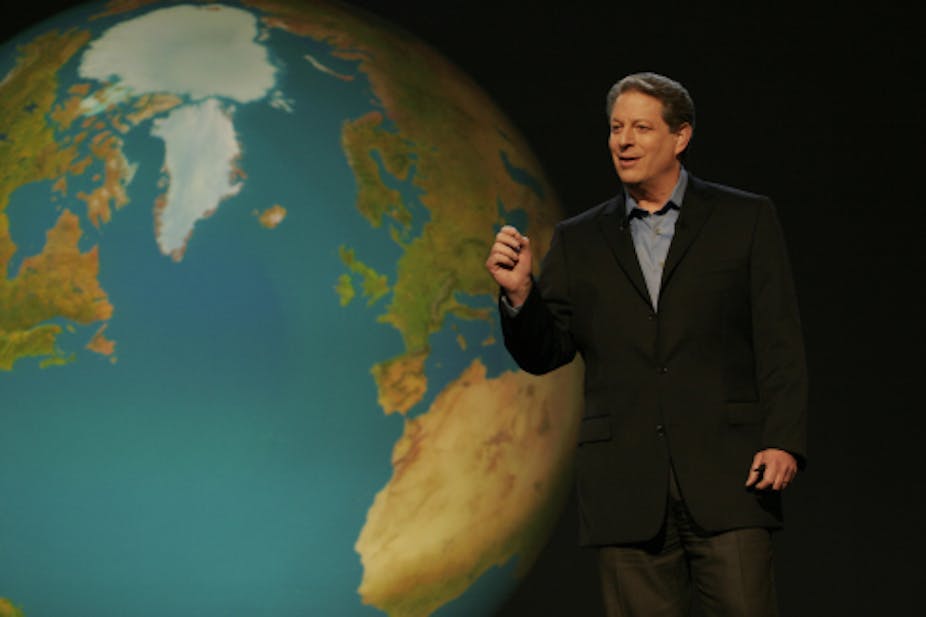With the momentum of his Inconvenient Truth gradually fading, Al Gore has launched a new climate change action campaign - the Climate Reality Project.
The centrepiece of the campaign is a day of action called the “24 Hours of Reality”.
Like so much in the climate communication sphere, it’s the kind of campaign that will do a lot for those who want to do something about climate change, and little for anyone else.
Where is the mechanism here that will finally get the unconverted or the hostile to agree with the need to take action on climate change?
There isn’t one.
Talking to those in the tent isn’t necessarily a problem. There are certainly times when you need to drum up the enthusiasm of the base.
But there is one aspect of the campaign that does need to be critiqued: the mindless and counter-productive demonisation of “Big Oil” and “Big Coal”. This echoes a regular refrain of The Greens here in Australia.
It’s as if somewhere out there “Big Oil” and “Big Coal” equivalents of Mr Burns, Mr Potter, Blofeld, Siegfried of KAOS and the Pentavirate are cooking up campaigns not to provide electricity and transport solutions, but to destroy humanity.
Ridiculous.
Those who got into the coal and oil industries did so for the simple goal of making a profit by providing us with the energy we need for the modern economy. They didn’t do it to be evil. They don’t want to destroy the world. They are not the nefarious oligarchs that so many would have you believe.
Yes, we now know that the carbon pollution produced by the coal and oil industries is a big problem for society. We all need to wean ourselves off such carbon intensive energy.
But we’re not going to do it by misrepresenting people’s intentions and calling them names. We’re not going to do it by punishing people who acted in good faith.
We’re only going to convince people to change by lining up their profit motive with everyone’s need for a low-carbon economy.
Yes, that’s right. We need to support the fat cats, just as we need to support anyone else in transition.
We need to encourage those who invest in coal and oil to move their money to less carbon-intensive investments. Incentive, not invective.
These captains of industry are not our enemies. They need to be our allies in de-carbonising the economy.
Yet while the talk of “Big Oil” and “Big Coal” continues, those who are less favourably disposed to change - perhaps because it’s easier right now not to do the planning, not to take the next step - are able to portray the climate action movement as actually more worried about the “Big” (as in “Big Business”) than the “Oil” or “Coal”.
So what should you do? Here are three things you can do now:
Assume good faith amongst those who advocate different things to you. They may be motivated by profit, but that doesn’t mean they’re evil. ‘Profit’ does not equal ‘evil’.
Challenge conspiracy theories, whether of the left or the right. Just as much as we need to reject the idea that “Big Coal” wants to destroy the planet, so too should we reject the clownish idea that scientists are corrupt plotters seeking totalitarian world government, or better yet, the forces of darkness. We’re just not. If someone is nominally on your side (ie, you want the same outcomes or you’re in the same political party), then you need to challenge their conspiratorial thinking more, not less.
Remember the goal. This is about limiting and (eventually) reversing climate change. Other fights, from name-calling squabbles to building a social democratic utopia, must be put to the side.
And one final note to the hippies on Al Gore’s campaign: saying that the campaign will allow “the world to join hands” is like an anti-shibboleth, marking your community as one many wouldn’t want to join.
We don’t have to touch each other to solve climate change. We don’t even have to like each other.

